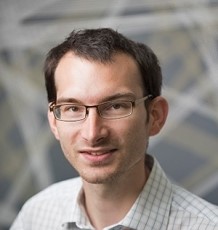Lab on a Chip is delighted to introduce our most recent Emerging Investigator, Fabrice Gielen!
Dr. Fabrice Gielen is an Independent Research Fellow at the Living Systems Institute, University of Exeter. He obtained his PhD from Imperial College London during which he studied cellular membrane dynamics using a combination of single cell microfluidic trapping techniques and single molecule spectroscopy with Profs. Joshua Edel and Andrew deMello. He subsequently moved to Cambridge as a Post-Doctoral Research Associate with Prof. Florian Hollfelder to contribute to the field of ultra-high-throughput biocatalyst evolution. He is a Founder and Scientific Director of Drop-Tech Ltd, which commercializes droplet-on-demand platforms. His research interests include developing novel tools and methods to study and harness single cells with applications in bacteria-phage interactions, protein evolution and regenerative medicine.
Read Dr Gielen’s Emerging Investigator paper* “Deep learning guided image-based droplet sorting for on-demand selection and analysis of single cells and 3D cell cultures” and find out more about him and his research in the interview below.
Your recent Emerging Investigator Series paper focuses on sorting of single droplets for selection and analysis of single cells and 3D cell cultures. How has your research evolved from your first article to this most recent article?
My first article (long ago already!) presented a microfluidic device for trapping and focussing microparticles within microchannels. The common theme with my present work is how precise control at the microscale enables us to perform novel types of biological experiments across populations. We can now truly benefit from the progress made in engineering, computing and optical setups to study biology, not just faster but in fundamentally different ways than was possible when I started my career.
What aspect of your work are you most excited about at the moment?
Studying single cells holds the promise to understand biology down to its fundamental unit. I joined the Living Systems Institute at the University of Exeter to exploit the advantages of droplet microfluidics in terms of single cell control and interrogation for the study of complex biological systems. Since then, I have developed multiple interests ranging from the behaviour of unicellular organisms, cellular differentiation or the discovery of novel antimicrobials. I believe there is also a large scope for other, yet unforeseen applications.
In your opinion, what is the biggest advantage to using your platform for classifying single droplet images compared to other methods?
Images hold a lot of information and machines can uncover patterns where humans cannot. Recent technological progress allows us to combine image acquisition and analysis in real-time. Problems such as image classification used in medical diagnostics or selection to isolate rare cell types benefit enormously from machine learning tools that can identify objects only using human-labelled training data. Our paper shows one way of doing this is by using convolutional neural networks which can be trained to recognize several types of micro-objects simultaneously.
What do you find most challenging about your research?
The ability to combine in a single experiment microfluidic workflows, biological entities, and biochemical reactions has the flipside that successful and conclusive experiments happen only when all these variables coincide (which is sometimes rare!). On the bright side, microfluidics has gone a long way in terms of reproducibility and long-term functionality and the onus is now more on the biology.
At which upcoming conferences or events may our readers meet you?
I am planning to attend the MicroTAS 2020 (Palm Springs) and EMBL microfluidics (Heidelberg).
How do you spend your spare time?
I like to take the family out to visit Devon and the Jurassic Coast, which I highly recommend to anyone visiting the region.
Which profession would you choose if you were not a scientist?
I would go for musician/composer, maybe pianist.
*Dr Gielen’s paper is free to access with an RSC account for the next month.











